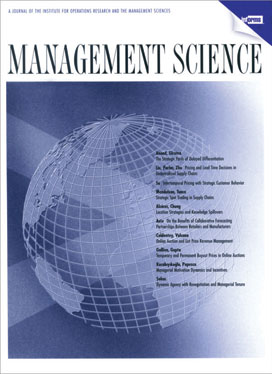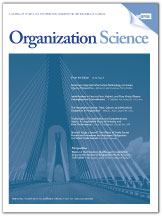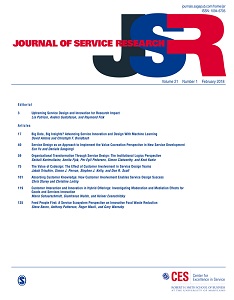Academic articles
Practitioner articles
Working papers
Books
Book chapters
Case studies
Other publications
Subject(s)
Human resources management/organizational behavior
Keyword(s)
Crowdsourcing science, replication, reproducibility
Researchers agree that replicability and reproducibility are key aspects of science. A collection of Data Descriptors published in Scientific Data presents data obtained in the process of attempting to replicate previously published research. These new replication data describe published and unpublished projects. The different papers in this collection highlight the many ways that scientific replications can be conducted, and they reveal the benefits and challenges of crucial replication research. The organizers of this collection encourage scientists to reuse the data contained in the collection for their own work, and also believe that these replication examples can serve as educational resources for students, early-career researchers, and experienced scientists alike who are interested in learning more about the process of replication.
This work is licensed under a Creative Commons Attribution 4.0 International License CC-BY.
Volume
4
ISSN (Online)
2052-4463
Subject(s)
Finance, accounting and corporate governance
Keyword(s)
Financial disintermediation, crowdfunding, consumer lending
JEL Code(s)
G01, G20, G21, G23
This paper analyzes the substantially growing markets for crowdfunding, in which retail investors lend to borrowers without financial intermediaries. Critics suggest these markets allow sophisticated investors to take advantage of unsophisticated investors. The growth and viability of these markets critically depends on the underlying incentives. We provide evidence of perverse incentives in crowdfunding that are not fully recognized by the market. In particular we look at group leader bids in the presence of origination fees and find that these bids are (wrongly) perceived as a signal of good loan quality, resulting in lower interest rates. Yet these loans actually have higher default rates. These adverse incentives are overcome only with sufficient skin in the game and when there are no origination fees. The results from the analysis in this paper provide more general implications for crowdfunding, its structure and regulation.
© 2016 INFORMS
Volume
63
Journal Pages
587–608
ISSN (Online)
1526-5501
ISSN (Print)
0025–1909
Subject(s)
Economics, politics and business environment
Keyword(s)
LeChatelier principle, cost passthrough, multiproduct oligopoly
JEL Code(s)
C72, D43, D11
The LeChatelier-Samuelson principle states that, as a reaction to a shock, an agent's short-run adjustment of an affected action is smaller than its long-run adjustment (when the agent can also adjust other related actions). We extend the principle to strategic environments where the long-run adjustment also accounts for other players adjusting their strategies. We show that the principle holds for supermodular games (strategic complements) satisfying monotone comparative statics and provide sufficient conditions for the principle to hold in games of strategic substitutes/heterogeneity. We discuss the principle's implications for cost pass-through of multiproduct firms.
Volume
168
Journal Pages
44–54
Subject(s)
Information technology and systems; Technology, R&D management
Keyword(s)
open innovation, review, research, theory, contingencies, knowledge, collaboration
JEL Code(s)
D83, O30
This paper provides an overview of the main perspectives and themes emerging in research on open innovation (OI). The paper is the result of a collaborative process among several OI scholars – having a common basis in the recurrent Professional Development Workshop on “Researching Open Innovatio” at the Annual Meeting of the Academy of Management. In this paper, we present opportunities for future research on OI, organised at different levels of analysis. We discuss some of the contingencies at these different levels, and argue that future research needs to study OI – originally an organisational-level phenomenon – across multiple levels of analysis. While our integrative framework allows comparing, contrasting and integrating various perspectives at different levels of analysis, further theorising will be needed to advance OI research. On this basis, we propose some new research categories as well as questions for future research – particularly those that span across research domains that have so far developed in isolation.
Volume
24
Journal Pages
8–40
Subject(s)
Information technology and systems; Technology, R&D management
Keyword(s)
Bitstream encryption vulnerability, FPGA security, bitstream fault injection, automated key recovery, AES
Volume
PP
Journal Pages
1–13
Subject(s)
Human resources management/organizational behavior
Keyword(s)
Brokerage process, unembedded interactions, tertius gaudens and tertius iungens, relational event model
Organizational network research has demonstrated that multiple benefits accrue to people occupying brokerage positions. However, the extant literature offers scant evidence of the process postulated to drive such benefits (information brokerage) and therefore leaves unaddressed the question of how brokers broker. We address this gap by examining the information-brokerage interactions in which actors engage. We argue that the information-brokerage strategies of brokers differ in three critical ways from those of actors embedded in denser network positions. First, brokers more often broker information via short-term interactions with colleagues outside their network of long-term relationships, a process we label “unembedded brokerage.” Second, when they engage in unembedded brokerage, brokers are more likely than are actors in dense network positions to intermediate the flow of information between the brokered parties, consistent with a tertius gaudens strategy. Conversely, and third, when they broker information via their network of long-term ties (embedded brokerage), brokers are more likely than are densely connected actors to facilitate a direct information exchange between the brokered parties, consistent with a tertius iungens strategy. Using a relational event model, we find support for our arguments in an empirical analysis of email communications among employees in a medium-sized, knowledge-intensive organization, as well as in a replication study. The theory and evidence we present advance a novel, temporal perspective on how brokers broker, which reconciles structural and process views of network brokerage. Our findings substantiate the notion of brokers as a dynamic force driving change in organizational networks, and they help to integrate within a unitary explanatory framework tertius iungens and tertius gaudens views of brokerage.
© 2016, INFORMS
Volume
27
Journal Pages
1343–1360
Subject(s)
Marketing
Keyword(s)
Service expectations, customer satisfaction, information processing, ability to evaluate, motivation to evaluate
JEL Code(s)
M310
Extant research established that customers’ expectations play an ambivalent role in the satisfaction formation process: while higher expectations are more difficult to meet and thus cause dissatisfaction, they simultaneously increase satisfaction via customers’ perceived performance owing to a placebo effect. However, to date, knowledge is scarce on the question under which conditions either the positive or negative effect of expectations on satisfaction prevails. Building on information processing theory, the authors hypothesize that an essential contingency of the indirect, placebo-based effect is the degree to which customers are able and motivated to process a service experience. Three studies with a total of over 4,000 customers in different service contexts provide strong evidence for this hypothesis. Thus, managers are well advised to provide a realistic or even understated prospect if the service context favors customers’ ability or motivation to evaluate. Conversely, if customers are neither able nor motivated to evaluate the service, increasing customer expectations represents a viable strategy to enhance satisfaction. Relatedly, if customers hold low service expectations, managers should foster customers’ ability and motivation to evaluate the service. In contrast, if service expectations are high, managers may benefit from reducing the likelihood that customers overly focus on the service performance.
With permission of SAGE Publishing
Volume
19
Journal Pages
361–379
Subject(s)
Economics, politics and business environment
Keyword(s)
Multimarket firms, entry, predation, reputation
Volume
81
Journal Pages
571–579
Subject(s)
Human resources management/organizational behavior
Keyword(s)
Decision making, ethics, psychology, research management
We present the data from a crowdsourced project seeking to replicate findings in independent laboratories before (rather than after) they are published. In this Pre-Publication Independent Replication (PPIR) initiative, 25 research groups attempted to replicate 10 moral judgment effects from a single laboratory’s research pipeline of unpublished findings. The 10 effects were investigated using online/lab surveys containing psychological manipulations (vignettes) followed by questionnaires. Results revealed a mix of reliable, unreliable, and culturally moderated findings. Unlike any previous replication project, this dataset includes the data from not only the replications but also from the original studies, creating a unique corpus that researchers can use to better understand reproducibility and irreproducibility in science.
Volume
3
ISSN (Online)
2052-4463
Subject(s)
Management sciences, decision sciences and quantitative methods
Keyword(s)
Shapley value, potential, random partition, concentration of power, communication graph, fairness, efficiency, efficient extension, fair extension, Myerson value
JEL Code(s)
C71, D60
We study values for TU games with a communication graph (CO-values). In particular, we show that CO-values for connected graphs that are fair and efficient allow for a unique efficient and fair extension to the full domain.
With permission of Elsevier
Volume
146
Journal Pages
103–106



